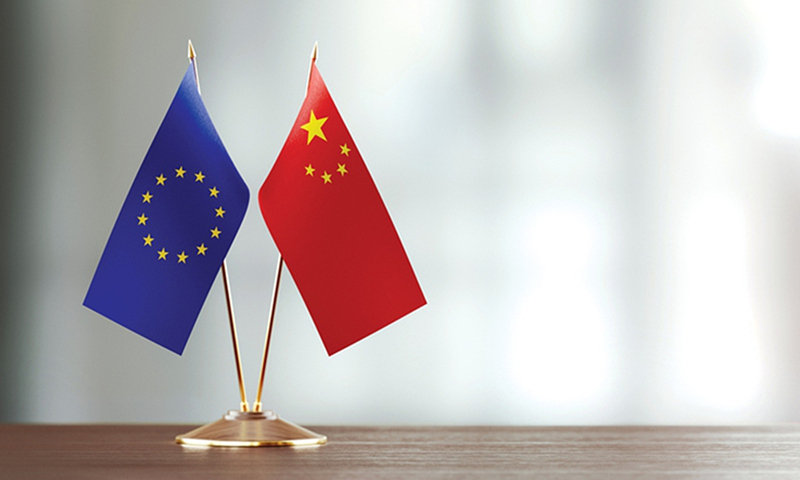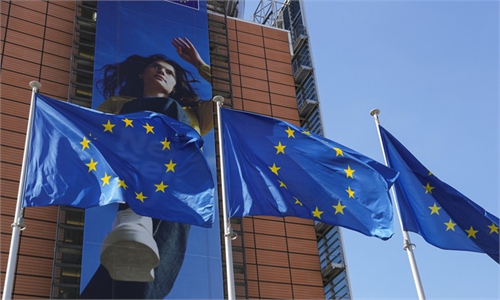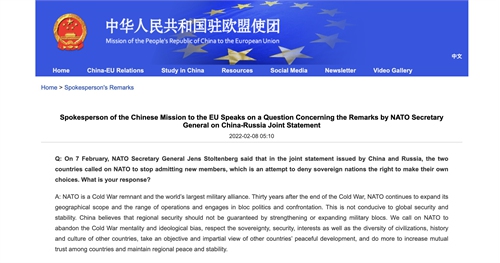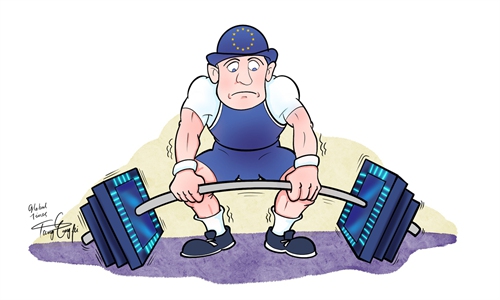COMMENTS / EXPERT ASSESSMENT
Biz Quick Take: EU must recognize Lithuania's mistake, or reported talks will be futile

China-EU Photo: VCG
The EU appears to be increasingly putting itself into a diplomatic dispute between China and Lithuania over the Taiwan question. After it filed a case at the WTO claiming "economic coercion" by China against Lithuania last month, a claim that has been refuted by China, it now seems to be seeking "consultations" with Beijing.
On Tuesday, the South China Morning Post reported that the EU is set to hold talks "in the coming weeks" with China over the allegation against China for violating global trade rules. "Consultations will be held and the EU is preparing for them," an EU spokesperson said, according to the report.
There has been no public confirmation yet from Chinese officials over the reported talks but it appears that the EU requested such consultations when it filed the case at the WTO last month. The reported talks seem to be a common procedure among members of the global trade body.
China agreeing to such consultations is a positive step, showing respect to the WTO process as well as sincerity in holding open dialogues. However, it would be a grave mistake for anyone to read the move as any sign from the Chinese side that there is room for negotiation regarding Lithuania's vicious and dangerous mistake of challenging China's core national interests.
Lithuania, the EU, or any party for that matter, should not overlook the seriousness of Lithuania's decision in supporting Taiwan secessionist forces. They should never underestimate China's resolve to defend its sovereignty, security and development interests.
When it comes to the nature of Lithuania's mistake in the Taiwan question, there is no room for negotiation. The EU should recognize that as a starting point for any meaningful consultation with China. Otherwise, the talks, even if they take place, will not yield any concrete results.
Regarding the EU's claim that China has used "economic coercion" against Lithuania and has hurt the business of EU firms, they are a complete lie without basis. Since its mistake in undermining China's core national interest, Lithuania has behaved like an ant on a hot pan, trying to grab on anything to save itself and taking the example from Australia in cooking up claims of "economic coercion."
Here is the fact: no Chinese official or government agency has so far announced any economic countermeasures against Lithuania. Some accusations by European and Lithuanian individuals that Chinese authorities have removed Lithuania from a customs list are false, as the Global Times has reported many times.
Indeed, some Chinese companies were considering plans to source some products from elsewhere instead of Lithuania. However, these were decisions made independently by the companies based on their assessment of growing risks under the souring diplomatic ties. They were not instructed by any government agency to do so, a number of companies told the Global Times, and that should be a normal and wise strategy for any business, whether in China, the EU or anywhere because businesses are very sensitive over potential risks on their operations.
Some in the EU have apparently been convinced by Lithuania of the claims of "economic coercion" even though there was no evidence to back up such allegations as they filed the WTO suit against China. However, instead of facts and evidence, some in the EU seem to be biased by ideological and political interests. Their lurid accusations against China might just be an ill-advised attempt to support Lithuania. If that is the case, then the situation will not improve and could even further deteriorate.
However, if the EU is ready to dialogue on the basis of objectivity and mutual respect, there is always room for talks to address each other's concerns, especially if the EU feels there is any issue to be discussed that involves the WTO. China has made it clear that it will handle relevant cases in accordance with WTO rules.



